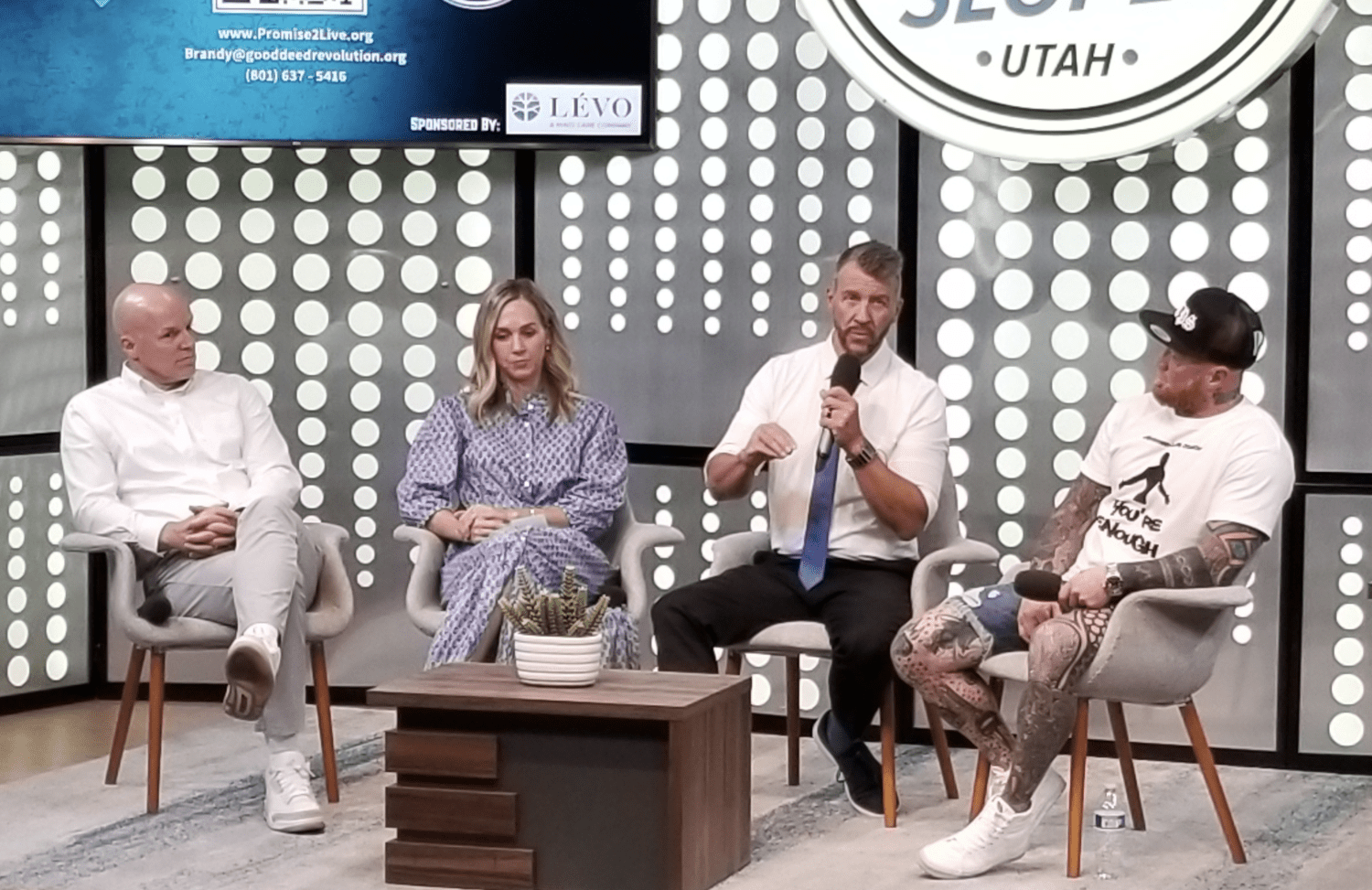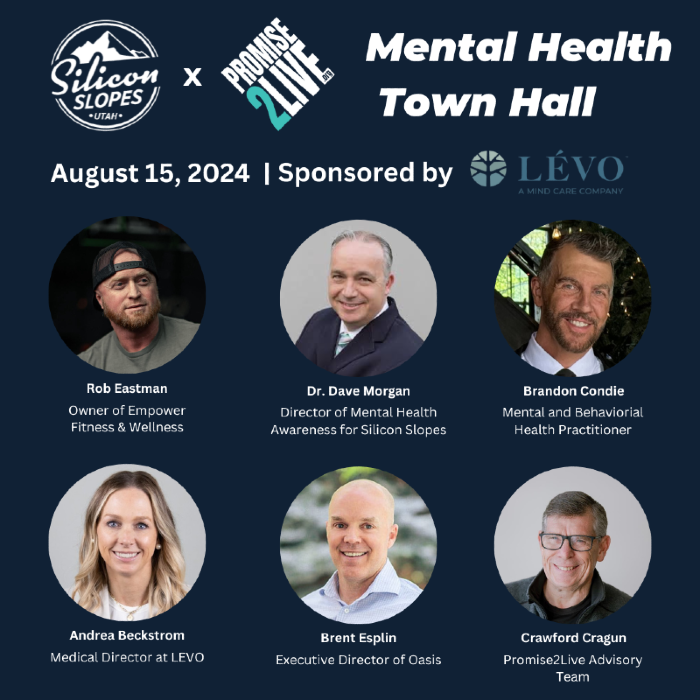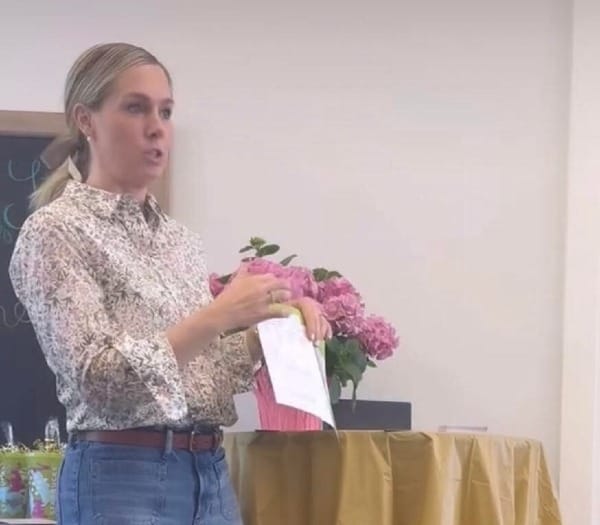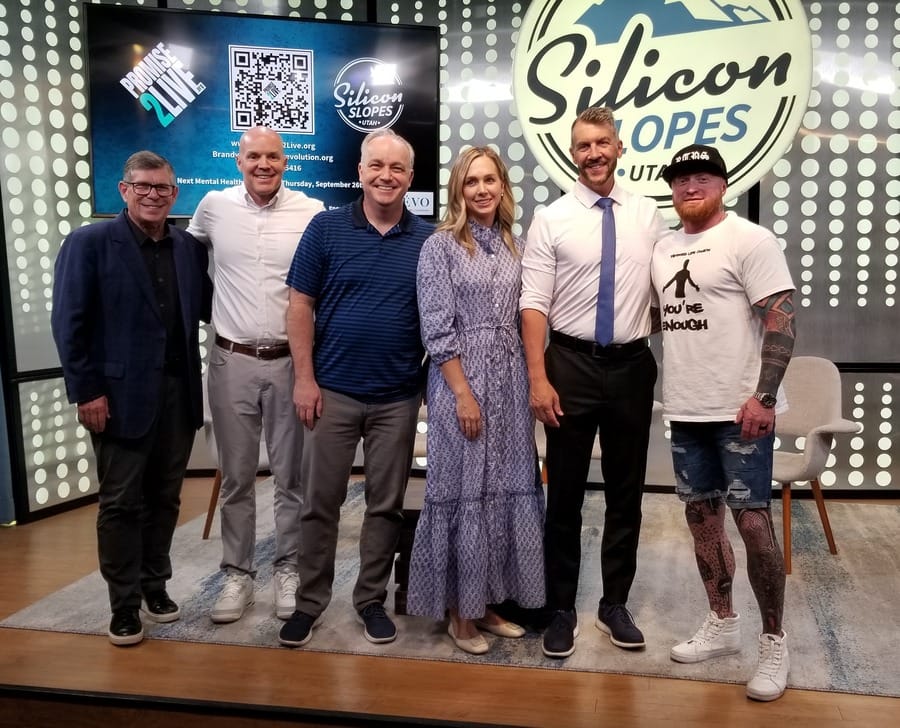


Continuing our Promise2Live mental health series, we introduce Andrea Beckstrom, Owner and Medical Director of LÉVO, and one of the event sponsors.
See the inaugural article in this series—the January 16, 2024 profile story about Promise2Live, authored by Promise2Live founder, Brandy Vega.
The second article in this series—an introduction Tom Telford's BrainStoke podcast—can be found here.
The third article in the series was written by Richard Godfrey, Co-founder and CEO of Avec Me. It discusses fitting prosthetic limbs for elephants that have been injured by landmines in Cambodia. Read it here.
The fourth article in the series features Cameron McBride, CEO of Blomquist Hale Solutions, a Salt Lake City-based company specializing in mental health solutions, who shares tips on how to provide help to those who are struggling.
The sixth article in the series came from Ganel-Lyn Condie who shared profound lessons about suicide prevention from her sister Meggan's suicide.
The seventh article came from Joe Tuia'ana who presented the i love you, bro PROJECT, a suicide prevention program for men.
The eighth article in the series featured Carrie Hill who shared how she navigated unaddressed mental health issues within her own family.
The ninth article in the series was written by Brent Esplin, Executive Director of Oasis.
The article below, the tenth article in the series, was written by Andrea Beckstrom. She will participate in another Silicon Slopes & Promise2Live Mental Health Town Hall on Thursday, August 15, 2024 at the Silicon Slopes HQ from noon until 2pm.
She will be joined by Dr. Dave Morgan, Brandon Condie, Brent Esplin, Crawford Cragun, and Brandy Vega, the organizer of the series.
The event is free, as always, but the organizers highly appreciates it when people register. Do so here. Lunch will be provided, courtesy Andrea Beckstrom's company, LÉVO.

Skiing the Waters of Mental Health
By Andrea Beckstrom

I had a wakeup call several years ago while I was on the lake in Island Park, Idaho. I love being active, especially waterskiing. That day, floating in the perfectly smooth and clear water, I could feel the usual nerves of waiting for the ski rope to pull taut and drag my ski to the surface of the water. After the boat roared forward, I was dragging through the water, but something felt different. I couldn’t pop out of the water and glide on my ski behind the boat. I got dragged. My arms felt like they were going to be pulled from my shoulders. I was taking in so much water through my mouth and nose that my sinuses were flooding, and I couldn't breathe. Reluctantly, I let go of the rope. Still hopeful, I tried again and again. Finally, I had to give up on the excitement of skiing that day. I was too weak to do it.
I was devastated and felt defeated. I got into the boat realizing that not only was my mental health in a bad place, but my physical health as well. I wasn’t taking care of myself or taking time to prioritize caring for my brain and body. These feelings were all too familiar. Many years prior, I was in a place of loneliness and despair when I dealt with an eating disorder, anxiety, disordered eating, and later, during my childbearing years after multiple miscarriages—depression. I knew how it felt to be at my lowest moments, and I was once again in that headspace of “how did I get here” and “how do I heal?”
Although I had been working in the world of psychiatric care for some time, I had not read much, if any, of the research, regarding the connection between good nutrition and mental health. I didn’t realize how impactful this connection can be. I dove into studying how poor gut health affects the brain and mental wellness. The gut is often referred to as our “second brain.” Much of our brain health is influenced by our gut and microbiome (our largest immune system support).
Poor gut health not only creates GI stress, but it can also cause anxiety by activating the amygdala (our fear and survival motor) and decreasing the release of GABA (an amino acid that acts as a calming neurotransmitter in the brain). Poor gut health is also linked to depression, brain fog, autism, ADHD symptoms, poor absorption of nutrients that support mental health, impaired production of sleep hormones which can lead to sleep issues, and decreased resilience to stress.
As a mental health professional, and the Medical Director of LEVO, I have the incredible opportunity to teach clients not only about the effects medication may have on their mental health, but also small behavioral changes they can make to improve where they are mentally and physically.
I don’t tell people to cut things out of their diet, but rather to focus on what they can ADD! In our society, there is so much advice that focuses on strict rules, forbidden foods, and expectations that are unattainable in the long term. By simply adding things into our diets that nourish our body and brain, we are more likely to stick with them long term. Unlike strict diets, we can position ourselves for success by not having to eat perfectly. Perfect eating does not exist!
If we focus on strict rules and cutting out certain fear foods or “bad” foods, the brain will start to obsess over those things. By gently putting the focus on what we can add in and knowing the WHY behind it helps so we don’t have to go without anything that we enjoy. We then start to nourish our gut and brain with foods that make them work smarter, not harder.
When I am sitting with a client, I will often encourage them to start incorporating aspects of a Mediterranean style diet into their weekly practice. I want to give small, manageable tips because nobody wants another to-do to overwhelm their day or life. I love arming clients with things that are within their control—such as eating nourishing foods—and can give them the tools to make those changes in their lives. At a time when they feel out of control, such as when they end up in my office, it can be helpful for them to have something they feel can contribute to their well-being.
I educate them on what is included in a Mediterranean diet such as fish, beans, nuts, olive oil, vegetables, fish, fruits, and whole grains. I will further explain what it does neuro-chemically in our bodies.

Nutritious food, such as those found in this diet, increases BDNF, which is brain-derived neurotrophic factor, which is like ‘Miracle-Grow’ for the brain. 1 BDNF plays a key role in keeping mood, memory, and mental processing at their peak. The reason it’s been dubbed this is because it’s so vital for brain-cell growth, repair and signaling. And while levels can dip from our 30s to our 50s and continue to decline, boosting BDNF is possible, and even can be easy.
Many clients tell me that they hate fish and vegetables, and eating “healthy” is too expensive and difficult. I explain to them that studies have been done to show that eating a more organic, nourishing diet, was no more expensive than a typical American diet with highly processed snacks and meals that are expensive. One study shows that the American diet is reduced in BDNF, as we eat a lot more processed foods and not enough leafy greens and vegetable.
It’s important to note you don’t have to eat fish to reap the benefits. You can substitute with a fish oil supplement. A tablet containing omega-3 polyunsaturated fatty acids (PUFAs), which may help prevent or treat depression and other mood disorders. PUFAs may work by reducing inflammation. There is evidence supporting the hypothesis that inflammation plays a role in the cause of some forms of depression and fatigue. 3 PUFAs may also help by making it easier for serotonin to pass through cell membranes, as cell membranes are made up partly of omega-3s. This is why in one study, called the SUN Study, it showed that a diet that includes fish oil (or fish) can potentially prevent episodes of depression.
As I worked hard on my mental and physical health, I was able to feel stronger in both areas and it continued to improve each month. What does that day look like today in my eating habits? I would put avocado into more of my meals such as on my toast at breakfast. I began taking a fish oil supplement every night to increase the amount of omega-3s I was getting. I also began putting chia seeds into my smoothies and ground flaxseed in my oatmeal. I now use olive oil most of the time in my cooking, but still use butter when I want to. There are no rules or restrictions.
It’s important to remember, I didn’t do all of this at once. I added one piece at a time. Many weeks I would forget to take my fish oil supplement, but I would recommit and start again. It’s not about perfection, but about being as consistent as we are able. Little by little, I felt more and more motivated to keep adding more. I noticed feeling different. Better! Which reinforced the habits and my commitment.

The next summer, I was nervous to try and waterski again. I doubted myself, even though I had done a lot of hard work. But I tried and I got up. I almost crashed immediately as I “fist pumped” into the air and lost focus, I was up! I hadn’t noticed any huge change at once. But, in that moment, I knew all the small improvements I had implemented had paid off.
Changing our habits doesn’t happen in a week, or a month, or often even in a year. It takes time. While it’s important to work on yourself, it’s equally important to appreciate who you are at each stage of your journey. This involves recognizing your strengths and accomplishments and being kind to yourself during challenging times or when progress seems slow. Remember that you are the greatest project you will ever work on.
Take your time.
Andrea Beckstrom will be a part of a panel for the Silicon Slopes & Promise2Live Mental Health Town Hall on Thursday, August 15, 2024 at the Silicon Slopes HQ from noon until 2pm.
Other mental health experts on the panel include: Dr. Dave Morgan, Brandon Condie, Brent Esplin, Crawford Cragun, and Brandy Vega, the organizer of the series.
The event is free, as always, but please register for the event here. Lunch will be provided, courtesy Andrea Beckstrom's company, LÉVO.

